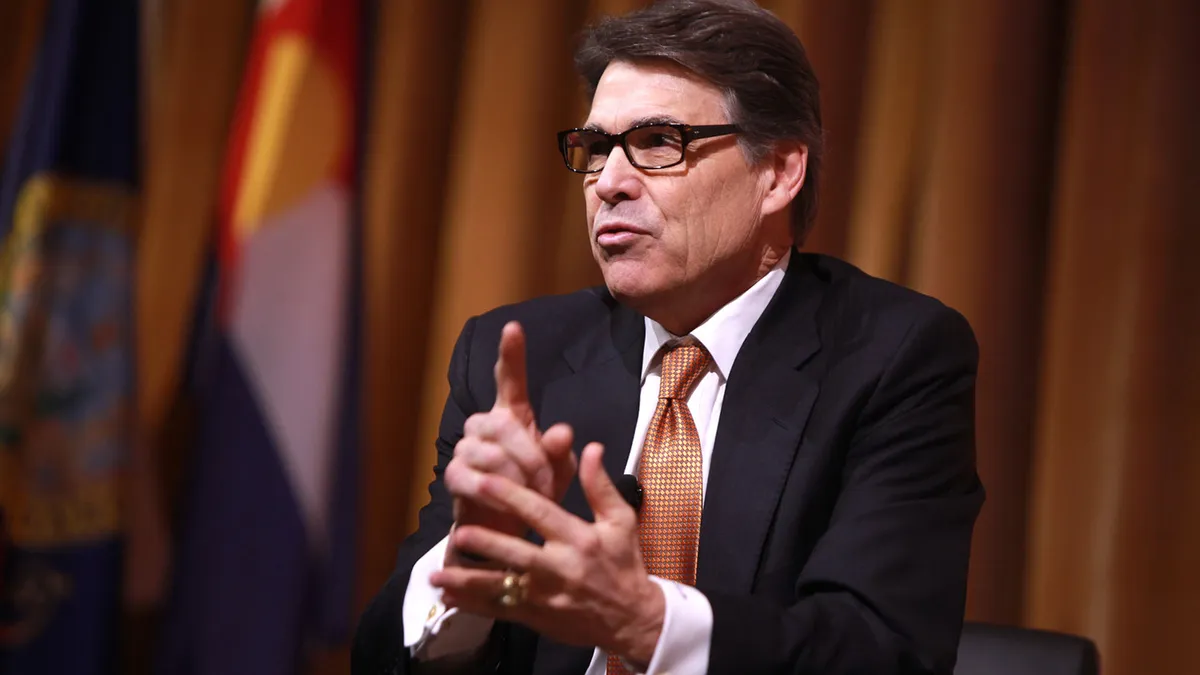Dive Brief:
- President-elect Donald Trump is poised to select former Texas Gov. Rick Perry (R) to be Secretary of Energy under his administration, multiple news outlets report.
- Perry favors a more limited role for the federal government in energy policy and during his 2012 presidential campaign, famously forgot his pledge to eliminate the Department of Energy during a live debate.
- Perry supports increased fossil fuel development and has ties to the industry, including sitting on the board of Energy Transfer Partners, a pipeline company building the controversial Dakota Access project. He also oversaw a major expansion of wind capacity during his time as governor.
Dive Insight:
Like Trump's other cabinet announcements, news of Perry's selection came through unnamed sources reported in a number of national media outlets. Perry met with Trump on Monday in New York and reportedly beat out Montana Sen. Joe Manchin (D-WV) and Texas businessman Ray Washburne for DOE job.
At first, the selection may seem ironic; Perry called for the elimination of the department during his 2012 campaign and forgot that pledge during a live, televised debate in 2011.
"It's three agencies of government when I get there that are gone: commerce, education and the um, what's the third one there? Let's see," Perry said. "I can't. The third one, I can't. Sorry. Oops."
That "oops" moment was widely seen as the end of a promising presidential campaign, but Perry's tenure included significant engagement with energy issues.
As governor, Perry oversaw a dramatic expansion in oil and gas production in Texas, helping keep the state's economy growing through the recession, and supported plans from utility TXU to add 11 coal units throughout the state, which never panned out.
During his two presidential campaigns, he advocated for less restrictive federal regulations on emissions and fossil fuel production, touting Texas as a national model.
Perry has also shown a willingness to support renewable energy, throwing his weight behind the Competitive Renewable Energy Zone transmission project in 2005. The $6.9 billion, 3,600 mile system now transports more than 18 GW of West Texas wind to load centers and is widely crediting with kickstarting the state's nation-leading wind deployment.
That past support for renewables does not appear to stem from a concern for the global climate. Perry repeatedly disavowed mainstream climate science during his presidential campaigns, calling it a "contrived phony mess" in his 2011 book Fed Up!
Perry's expected nomination comes after the Trump transition team sent a list of 74 questions to the Department of Energy asking officials to outline which employees worked on key Obama administration climate efforts, including the Clean Power Plan and Paris Climate Accord.
The letter sowed discontent among environmentalists and agency officials, the Washington Post reported, who fear the new administration will dismantle key clean energy programs, such as funding for emerging technologies. The appointment of a secretary who advocated scrapping the department is unlikely to assuage those concerns.
(Update 12/13: The Department of Energy said it will reject the request to name staffers who worked on climate change initiatives, The Hill reports.)
Trump's selection of Perry also reflects a trend of naming fossil fuel allies and insiders to his administration. Perry currently sits on the board of Energy Transfer Partners, USA Today notes, the company building the controversial Dakota Access Pipeline. The Army Corps. of Engineers put construction on hold earlier this month, but Trump has vowed to complete the project.
In addition to Perry, Trump is also expected to nominate Oklahoma Attorney General Scott Pruitt, who disavows climate science and has worked closely with the fossil fuel industry, to head the Environmental Protection Agency. Another climate skeptic, Rep. Ryan Zinke (R-MT), will be tapped for the Department of Interior.
And Exxon CEO Rex Tillerson is Trump's expected nominee for Secretary of State. While the company is under investigation for concealing climate research dating back to the 1970s, Tillerson has expressed conditional acceptance of climate science and support for a revenue-neutral carbon tax, though observers do not expect those stances to be prioritized in a Trump White House.
All nominees will have to be approved first by committees in the U.S. Senate before a full floor vote.
This article has been updated to reflect news that Rep. Ryan Zinke, and not Rep. Cathy McMorris Rodgers (R-WA), is expected to be nominated to head DOI.













